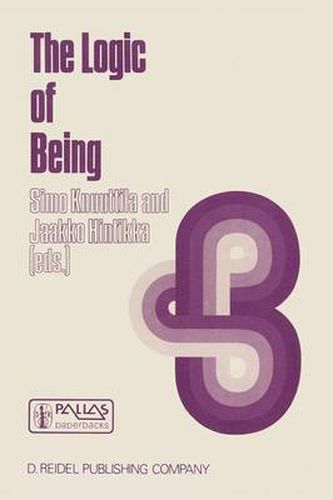Readings Newsletter
Become a Readings Member to make your shopping experience even easier.
Sign in or sign up for free!
You’re not far away from qualifying for FREE standard shipping within Australia
You’ve qualified for FREE standard shipping within Australia
The cart is loading…






This title is printed to order. This book may have been self-published. If so, we cannot guarantee the quality of the content. In the main most books will have gone through the editing process however some may not. We therefore suggest that you be aware of this before ordering this book. If in doubt check either the author or publisher’s details as we are unable to accept any returns unless they are faulty. Please contact us if you have any questions.
The last twenty years have seen remarkable developments in our understanding of how the ancient Greek thinkers handled the general concept of being and its several varieties. The most general examination of the meaning of the Greek verb ‘esti’/‘einai’/‘on’ both in common usage and in the philosophical literature has been presented by Charles H. Kahn, most extensively in his 1973 book The Verb ‘Be’ in Ancient Greek. These discussions are summarized in Kahn’s contribution to this volume. By and large, they show that conceptual schemes by means of which philosophers have recently approached Greek thought have not been very well suited to the way the concept of being was actually used by the ancients. For one thing, being in the sense of existence played a very small role in Greek thinking according to Kahn. Even more importantly, Kahn has argued that Frege and Russell’s thesis that verbs for being, such as ‘esti’, are multiply ambiguous is ill suited for the purpose of appreciating the actual conceptual assumptions of the Greek thinkers. Frege and Russell claimed that a verb like ‘is’ or'esti’ is ambiguous between the ‘is’ of identity, the ‘is’ of existence, the copulative ‘is’, and the generic ‘is’ (the ‘is’ of class-inclusion). At least a couple of generations of scholars have relied on this thesis and fre quently criticized sundry ancients for confusing these different senses of ‘esti’ with each other.
$9.00 standard shipping within Australia
FREE standard shipping within Australia for orders over $100.00
Express & International shipping calculated at checkout
This title is printed to order. This book may have been self-published. If so, we cannot guarantee the quality of the content. In the main most books will have gone through the editing process however some may not. We therefore suggest that you be aware of this before ordering this book. If in doubt check either the author or publisher’s details as we are unable to accept any returns unless they are faulty. Please contact us if you have any questions.
The last twenty years have seen remarkable developments in our understanding of how the ancient Greek thinkers handled the general concept of being and its several varieties. The most general examination of the meaning of the Greek verb ‘esti’/‘einai’/‘on’ both in common usage and in the philosophical literature has been presented by Charles H. Kahn, most extensively in his 1973 book The Verb ‘Be’ in Ancient Greek. These discussions are summarized in Kahn’s contribution to this volume. By and large, they show that conceptual schemes by means of which philosophers have recently approached Greek thought have not been very well suited to the way the concept of being was actually used by the ancients. For one thing, being in the sense of existence played a very small role in Greek thinking according to Kahn. Even more importantly, Kahn has argued that Frege and Russell’s thesis that verbs for being, such as ‘esti’, are multiply ambiguous is ill suited for the purpose of appreciating the actual conceptual assumptions of the Greek thinkers. Frege and Russell claimed that a verb like ‘is’ or'esti’ is ambiguous between the ‘is’ of identity, the ‘is’ of existence, the copulative ‘is’, and the generic ‘is’ (the ‘is’ of class-inclusion). At least a couple of generations of scholars have relied on this thesis and fre quently criticized sundry ancients for confusing these different senses of ‘esti’ with each other.